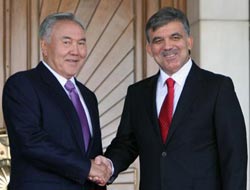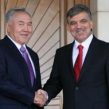
Moscow Watchful Over Kazakh-Turkish Partnership Agreement
Publication: Eurasia Daily Monitor Volume: 6 Issue: 199
By:

On October 21 Kazakhstan’s President Nursultan Nazarbayev met his Turkish counterpart Abdullah Gul in Ankara. During his extended official visit Nazarbayev prioritized cultural and economic links with Turkey and stressed the importance of the unity of Turkic nations. He visited the headquarters of TURKSOY, an organization created to promote Turkic culture, and he held talks with the Turkish Prime Minister Recep Tayyip Erdogan. The most significant outcome of the talks was the signing of an agreement on strategic partnership. The Turkish prime minister assessed the agreement as the most “unique document ever signed between a Turkic-speaking country and a Central Asian state” (Panorama, October 23).
Nazarbayev told the press that economic relations between Turkey and Kazakhstan have always been marked by rapid development. According to the statistical board of Kazakhstan, in 2008 the trade volume between the two countries reached $2.875 billion; representing marked progress compared to $1.9 billion in 2007. Turkey imports Kazakh oil and iron, while exporting textile products and construction materials. More than 1,400 Turkish business enterprises registered in Kazakhstan, mainly active within the construction industry, trade and services, invested $1 billion last year. In a symbolic move, Nazarbayev’s trip to Ankara was preceded by the erection of a monument to Mustafa Ataturk, the founder of the Turkish Republic. Underlying the rhetoric of Turkic fraternity and shared values, however, was the overriding issue of energy cooperation. The content of these talks were hidden by the pro-government media in Kazakhstan. Some sources, citing the Turkish Anadolu news agency said that Nazarbayev, speaking at the business conference in Istanbul, promised Ankara that Kazakhstan would participate in the much-debated Nabucco pipeline project (Trend News, October 24).
Such allegations confirm what Russian experts have long conjectured, before these talks began in Ankara. Referring to an unnamed Turkish newspaper, some experts feared that Turkey would dissuade Kazakhstan from selling its gas to Russia and urge Astana to pump it into Nabucco instead. However, more sober estimations indicated that since Kazakhstan lacks adequate infrastructure for the shipment of its gas and oil, the Nabucco project might be fraught with insurmountable material and financial expenses. To deliver its gas to Nabucco, Kazakhstan would have to create a solid logistical network and build a Trans-Caspian gas pipeline which might conflict with the political interests of other littoral states, above all Russia (Respublika, October 23).
It seems that Moscow has effectively forestalled any possible closer cooperation between Ankara and Astana in the energy sector by luring them into the Samsun-Ceyhan oil pipeline project with the participation of the Russian Rosneft and Transneft oil giants, Italian ENI and Turkish Calik companies. Kazakhstan will be the main supplier of oil for the Samsun-Ceyhan pipeline stretching from the Turkish Black Sea town of Samsun to the shores of the Mediterranean.
In Ankara, Nazarbayev was not quite so explicit about the participation of Kazakhstan in this project, but the Russian Prime-Minister Vladimir Putin, during his video-talk with his Turkish counterpart Erdogan, claimed that Kazakhstan had consented to fill the pipeline. Nonetheless, Astana is also considering the development of its own oil shipment routes from the Kashagan and Tengiz fields to Turkey as a part of the strategic partnership agreement signed in Ankara. Nevertheless, Nazarbayev, addressing the Turkish parliament, confirmed that his country will join the Russian-favored Samsun-Ceyhan project (Vestnik Kavkaza, October 26).
Moscow has many reasons to fear an intensification of economic and cultural links between its former Central Asian republics and Turkey. Shortly before his trip to Ankara, Nazarbayev attended together with the leaders of Kyrgyzstan, Azerbaijan and Turkey, the summit of the heads of the Turkic countries in Azerbaijan. Azerbaijan’s President Ilham Aliyev signed agreements with Nazarbayev on lifting the visa requirements on nationals from either country, agricultural cooperation and most importantly on the joint use of oil facilities of Azerbaijan’s State Oil Company for the development of Kazakh hydrocarbon resources and the creation of a joint logistics company. The Kazakh state-owned KazMunaiGas and the Azeri State Oil Company (SOCAR) signed a memorandum on cooperation in the development of the Baku-Black Sea pipeline project. Both sides also reached an agreement on conducting a technical feasibility study of the Trans-Caspian pipeline project expected to carry 23 million tons of oil annually in its initial phase of operation to increase the volume of annual oil deliveries up to 56 million tons in subsequent years (Liter, October 3).
These developments indicate Moscow’s determination to retain its influence on Kazakhstan’s energy policy. Repeated attempts by the Turkic nations of Central Asia to work out a common strategy to reduce such pressure from Moscow has so far failed to produce palpable results, due to the ambitions of its leaders and deepening disagreements over water and energy resources. Not surprisingly, Uzbekistan stayed away from the ninth summit of the heads of Turkic-speaking countries in Azerbaijan. Addressing his Turkish counterpart in Ankara, Nazarbayev said that Turkey’s balanced policy toward Russia and China increases its influence in Central Asia. But these diplomatic niceties cannot conceal political realities.




